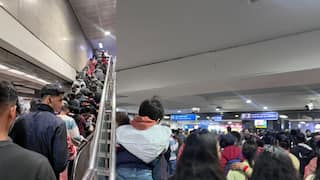Drone Attacks In Manipur Must Be Replied With Decisive Military Action By Centre

This week, three people were injured in a drone attack in a Meitei-majority village in the Imphal West district of Manipur. This village is located near the Kangpokpi district, which is predominantly Kuki-Zomi. It was the second drone attack in the area, following an attack last Sunday in another Meitei-majority village in the same district. That attack resulted in two deaths and nine injuries.
These drone attacks, allegedly carried out by Kuki-Zomi terrorists, indicate the worsening situation in the northeastern state, which has been deeply affected by last year’s ethnic violence between the Meiteis and Kuki-Zomis. The latest attack should prompt the central government to reassess the Suspension of Operations (SoO) agreement with 24 Kuki-Zomi terrorist groups. The annual extension of the Suspension of Operations (SoO) pact expired this year, but the central government has not yet issued an official statement regarding its renewal.
The Centre’s indecision has drawn criticism from the Meitei community, who are also frustrated with the state’s Biren Singh-led BJP government for failing to convince the Centre to end the SoO pact with the Kuki-Zomi groups. Allegations of bias have also been levelled against the Assam Rifles by the Meiteis, accusing them of favouring Kuki-Zomi terrorists.
The Centre must avoid showing leniency toward either Kuki-Zomi or Meitei terrorist groups. Any soft approach toward these groups could hinder efforts to restore peace and further polarise the communities. While inter-community dialogues are essential to bridge gaps, the current situation calls for decisive military action against those responsible for the violence. It is time for the central government to take strong measures, and these actions must be visible on the ground.
Peace Pact with Terrorist Groups: A Step Towards Stability in Tripura
This week, the central government and the Tripura state government signed a peace agreement with two terrorist groups — the National Liberation Front of Tripura (NLFT) and the All Tripura Tiger Force (ATTF) — in the presence of Union Home Minister Amit Shah. As part of the pact, 328 terrorists will surrender their arms. Shah announced that the Centre will allocate Rs 250 crore to develop areas previously affected by the activities of these groups. Both NLFT and ATTF were declared outlawed organisations by the Centre in October last year.
These groups, which once terrorised innocent people in the name of an "independent Tripura", have been significantly weakened due to efforts by the former Left Front government, led by Manik Sarkar, with support from both the Atal Bihari Vajpayee-led NDA and the Manmohan Singh-led UPA governments at the Centre.
Nevertheless, this peace pact is important. It comes at a time when northeastern terrorist groups are seeking to regain strength, potentially taking advantage of political changes in neighbouring Bangladesh, which has previously served as a haven for these groups. The Centre is determined to prevent these forces from reestablishing their bases, using their current weakness to bring them to the negotiating table. This agreement represents a step toward achieving lasting peace in Tripura.
Sushmita Dev Denies TMC’s Weakness In Assam
Trinamool Congress Rajya Sabha MP Sushmita Dev, who hails from the Bengali-speaking Barak Valley of Assam, has criticised Ripun Bora, the former president of TMC’s Assam unit, following his recent resignation. She alleged that Bora was upset because he was not nominated to the Rajya Sabha through West Bengal, where the TMC holds power.
Sushmita may be correct about Bora’s motivations, but isn’t his criticism that TMC is perceived as a West Bengal-centric party in Assam accurate? Why is Sushmita trying to dismiss this obvious fact?
Let’s be honest — TMC is not new to Assam. It first contested elections in the state in 2001, winning one seat. Notably, the party spent considerable resources during the 2011 assembly elections, as evidenced by its frequent advertisements on Assamese news channels during that time. Even then, TMC managed to win a seat.
So, Sushmita’s recent statement that TMC is a new party in Assam and needs time to establish itself does not align with the facts. The truth is that TMC has had a history of appearing and disappearing in Assam — something we’ve also seen in Tripura. The harsh reality is that TMC’s leadership in Bengal seems largely disconnected from the northeastern region, which is why the party has struggled to gain a foothold in Bengali-speaking Barak Valley or expand its organisation in Bengali-majority Tripura, despite its efforts since 1999.
The author is a political commentator.
[Disclaimer: The opinions, beliefs, and views expressed by the various authors and forum participants on this website are personal and do not reflect the opinions, beliefs, and views of ABP Network Pvt. Ltd.]


























